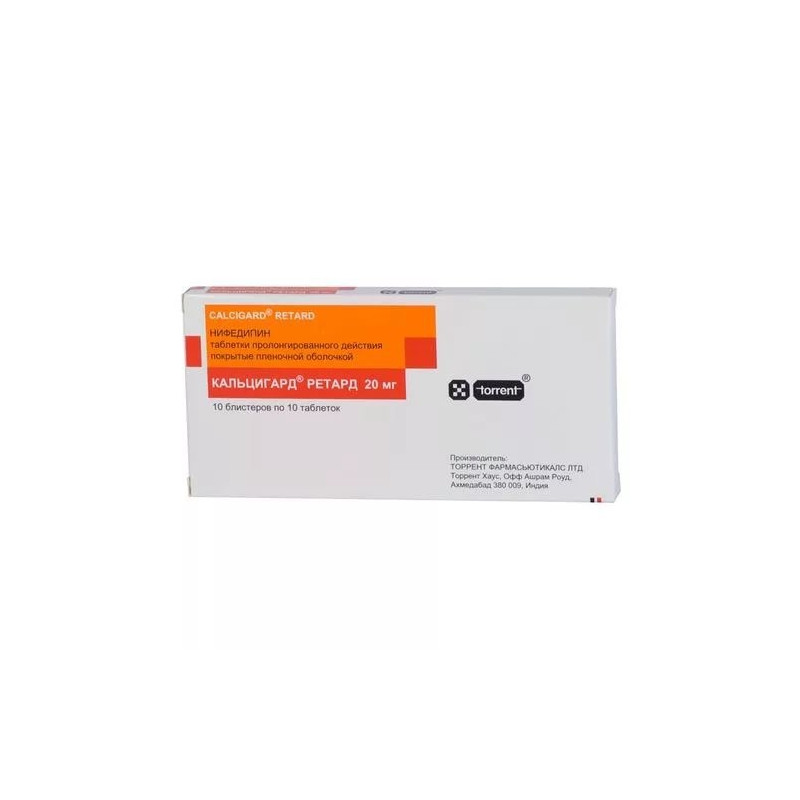



 All payments are encrypted via SSL
All payments are encrypted via SSL
 Full Refund if you haven't received your order
Full Refund if you haven't received your order
Coated tablets
1 pill of prolonged action contains: Nifedipine 20 mg.
Excipients: lactose, starch, microcrystalline cellulose, tween-80, polyethylene glycol, stearic acid, polyvinylpyrrolidone, Magnesium stearate, sodium lauryl sulfate.
In the blister of 10 tablets. In a cardboard bundle 10 blisters.
Calcigard Retard - Calcium channel blocker.
Calcigard Retard (nifedipine), a derivative of dihydropyridine, has antianginal and hypotensive activity.
It inhibits the entry of calcium ions into cardiomyocytes and vascular smooth muscle cells.
Relaxes the smooth muscles of the coronary and peripheral arteries.
Expanding peripheral vessels, reduces peripheral resistance and afterload on the heart.
Increases coronary blood flow, reduces myocardial oxygen demand.
When taken twice a day, Calcigard Retard provides control of high blood pressure for 24 hours.
Calcigard Retard lowers blood pressure in such a way that its percentage decrease is directly related to the initial value.
In patients with normal blood pressure, Calcigard Retard has little or no effect on blood pressure.
Calcigard Retard is intended for the treatment of:
- Stable angina pectoris.
- Vasospastic angina.
- Hypertension.
- Raynaud's Disease.
- Hypersensitivity to nifedipine, other dihydropyridine derivatives or other components of the finished dosage form.
- Arterial hypotension.
- Cardiogenic shock.
- Collapse.
- Severe aortic stenosis.
- Sick sinus syndrome.
- Instability of stenocardia.
- Severe heart failure.
- Acute stage of myocardial infarction (during the first 4 weeks).
- Pregnancy.
- Lactation period.
Contraindicated use during pregnancy and breastfeeding.
The dosage regimen is set individually.
The average dose is 1 pill (20 mg) twice a day with a small amount of liquid during or after a meal.
With insufficient severity of the clinical effect may gradually increase the dose.
The maximum dose of the drug is 40 mg twice a day.
Cardiovascular: possibly - facial flushing, feeling of heat, tachycardia, peripheral edema, arterial hypotension.Special instructions - in some patients, especially at the beginning of treatment, the occurrence of angina may occur, which requires discontinuation of the drug.
From the side of the central nervous system: headache, dizziness, fatigue, drowsiness. When using high doses of the drug, isolated cases of paresthesia of the extremities, tremor, mild visual disturbances, and sleep disturbance were noted.
From the gastrointestinal tract and liver: nausea, constipation, diarrhea. With prolonged use of the drug, there may be cases of increased activity of liver transaminases in the blood serum, the occurrence of intrahepatic cholestasis.
Hemic and lymphatic: in rare cases - reversible thrombocytopenia, leukopenia, anemia.
Urogenital: increase in daily diuresis; in patients with renal insufficiency - impaired renal function.
Allergic reactions: rarely - urticaria, pruritus.
Others: with prolonged use - myalgia, gynecomastia, gingival hyperplasia, hyperglycemia.
Caution should be exercised in the appointment of the drug Calcigard Retard in patients with hypotension, heart failure in the stage of decompensation, impaired liver and kidney function.
A small proportion of patients experience pain in the sternum 30–60 minutes after taking Calcigard Retard.
Although the effect of “robbery” was not found, patients who feel an increase in the symptoms of angina pectoris should interrupt the treatment with Calcigard Retard.
For patients with diabetes, the dose should be selected individually.
With the abolition of the drug dose is gradually reduced to prevent the development of "withdrawal syndrome".
During treatment should refrain from drinking alcohol.
Not recommended for use in children under 18 years.
With care to appoint a preparation to drivers of transport and to persons of other professions demanding fast psychomotor reaction.
With the simultaneous use of Calcigard and:
Beta-blockers, other antihypertensive drugs, tricyclic antidepressants, diuretics, vasodilators - the hypotensive effect of the drug is enhanced.
In combination with nitrates observed tachycardia and increased hypotensive action.
Diltiazem - reduced clearance of nifedipine. When using such a combination, it is necessary to reduce the dose of Calcigard and carefully monitor the patients.
Antiarrhythmic drugs (for example, Amiodarone and quinidine) - their negative inotropic effect may increase.
Digoxin - decreases the clearance of Digoxin, increases the level of digoxin in the plasma and the risk of digoxin intoxication. In these cases, it is necessary to reduce the dose of digoxin and check its level in the blood plasma.
Theophylline - possibly increasing the level of theophylline in the plasma, which requires dose adjustment.
Cimetidine and, to a lesser extent, Ranitidine - can increase the level of nifedipine in the plasma and increase its effect.
Vincristine - it is difficult for the latter to be eliminated from the body, which increases the risk of an increase in the side effects caused by vincristine.
Cephalosporins - increases the bioavailability of cephalosporins.
Symptoms: severe arterial hypotension, cardiac arrhythmias (bradycardia or tachycardia). With an increase in the effects of intoxication, hypoxia, cardiogenic shock, and impaired consciousness may occur.
Treatment: gastric lavage, reception of Activated carbon, intravenous administration of calcium salts. Symptomatic treatment. Hemodialysis is not effective.
Store at temperatures below 30 ° C in a place protected from light and moisture.
3 years.
Calcigard retard